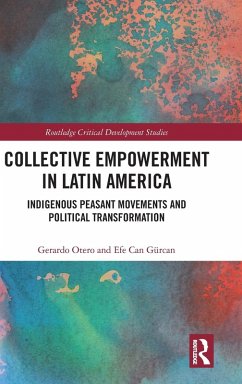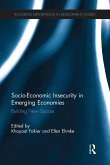This book develops a theory of collective empowerment that looks for change both from the bottom up, in civil society, and from the top down, from state interventions responding to such pressure.
Reflecting on the advancement of Indigenous and peasant movements in Latin America since the neoliberal reformation of capitalism in the 1980s, the book outlines a path for progressive social action in which bottom-up pressure by social movements can help progressive parties to gain state power. The book considers how Indigenous and peasant movements in Argentina, Bolivia, Brazil, Ecuador, and Mexico have tried to reshape crucial structures of society from the bottom up. While this mobilization from below is critical and necessary, the book argues that these movements must be supplemented by top-down change from progressive state interventions, as happened mostly in Bolivia and Brazil. The authors conclude that progressive societal action can have massive impact in transforming some of the main socioeconomic structures that determine humans' relation to the extraction of natural resources, income and wealth inequality, and even the location of a nation's insertion in world capitalism.
This book will be an important resource for social-movement activists and for researchers working in political sociology, sociological theory, political studies, development studies, social movements, and Latin American Studies.
Reflecting on the advancement of Indigenous and peasant movements in Latin America since the neoliberal reformation of capitalism in the 1980s, the book outlines a path for progressive social action in which bottom-up pressure by social movements can help progressive parties to gain state power. The book considers how Indigenous and peasant movements in Argentina, Bolivia, Brazil, Ecuador, and Mexico have tried to reshape crucial structures of society from the bottom up. While this mobilization from below is critical and necessary, the book argues that these movements must be supplemented by top-down change from progressive state interventions, as happened mostly in Bolivia and Brazil. The authors conclude that progressive societal action can have massive impact in transforming some of the main socioeconomic structures that determine humans' relation to the extraction of natural resources, income and wealth inequality, and even the location of a nation's insertion in world capitalism.
This book will be an important resource for social-movement activists and for researchers working in political sociology, sociological theory, political studies, development studies, social movements, and Latin American Studies.
"An ambitious book offering hope that a better world is possible, building on the collective empowerment of dominated groups, with the support of the state. Chapters focus on indigenous and other agrarian groups across Latin America. The book is both theoretically and empirically rich."
Susan Eckstein, Boston University, USA. Author, most recently, of Cuban Privilege, and recipient of the Latin American Studies Association 2023 Kalman Silvert Life-time Achievement Award
"By transcending class reductionism and addressing the mediations between class structural processes and political cultural formation, this book is a major achievement and is unmatched as a contemporary classic."
Adam David Morton, Professor, Discipline of Political Economy, University of Sydney, Australia
"This creative neo-Gramscian approach outlines a strategy of collective empowerment in which subordinate groups in Latin America overcome socially-constructed divisions via 'political-cultural formation', rejecting false dichotomies of class vs. identity. It offers hopeful analysis of Indigenous-peasant mobilizations challenging neoliberalism, with valuable insights for sociologists, Latin Americanists, and social movement scholar/activists."
Richard Stahler-Sholk, Professor Emeritus, Eastern Michigan University, USA
"An excellent reflection on the spoliation and disarticulating rigors that neoliberalism has imposed on the dominated. It is also a suggestive argument about a way out that would imply a class-identity rearticulation and a synergy between bottom-up collective empowerment and progressive state intervention from above."
Carlos Figueroa Ibarra, Research Professor, Benemérita Universidad Autónoma de Puebla, Mexico
Susan Eckstein, Boston University, USA. Author, most recently, of Cuban Privilege, and recipient of the Latin American Studies Association 2023 Kalman Silvert Life-time Achievement Award
"By transcending class reductionism and addressing the mediations between class structural processes and political cultural formation, this book is a major achievement and is unmatched as a contemporary classic."
Adam David Morton, Professor, Discipline of Political Economy, University of Sydney, Australia
"This creative neo-Gramscian approach outlines a strategy of collective empowerment in which subordinate groups in Latin America overcome socially-constructed divisions via 'political-cultural formation', rejecting false dichotomies of class vs. identity. It offers hopeful analysis of Indigenous-peasant mobilizations challenging neoliberalism, with valuable insights for sociologists, Latin Americanists, and social movement scholar/activists."
Richard Stahler-Sholk, Professor Emeritus, Eastern Michigan University, USA
"An excellent reflection on the spoliation and disarticulating rigors that neoliberalism has imposed on the dominated. It is also a suggestive argument about a way out that would imply a class-identity rearticulation and a synergy between bottom-up collective empowerment and progressive state intervention from above."
Carlos Figueroa Ibarra, Research Professor, Benemérita Universidad Autónoma de Puebla, Mexico








